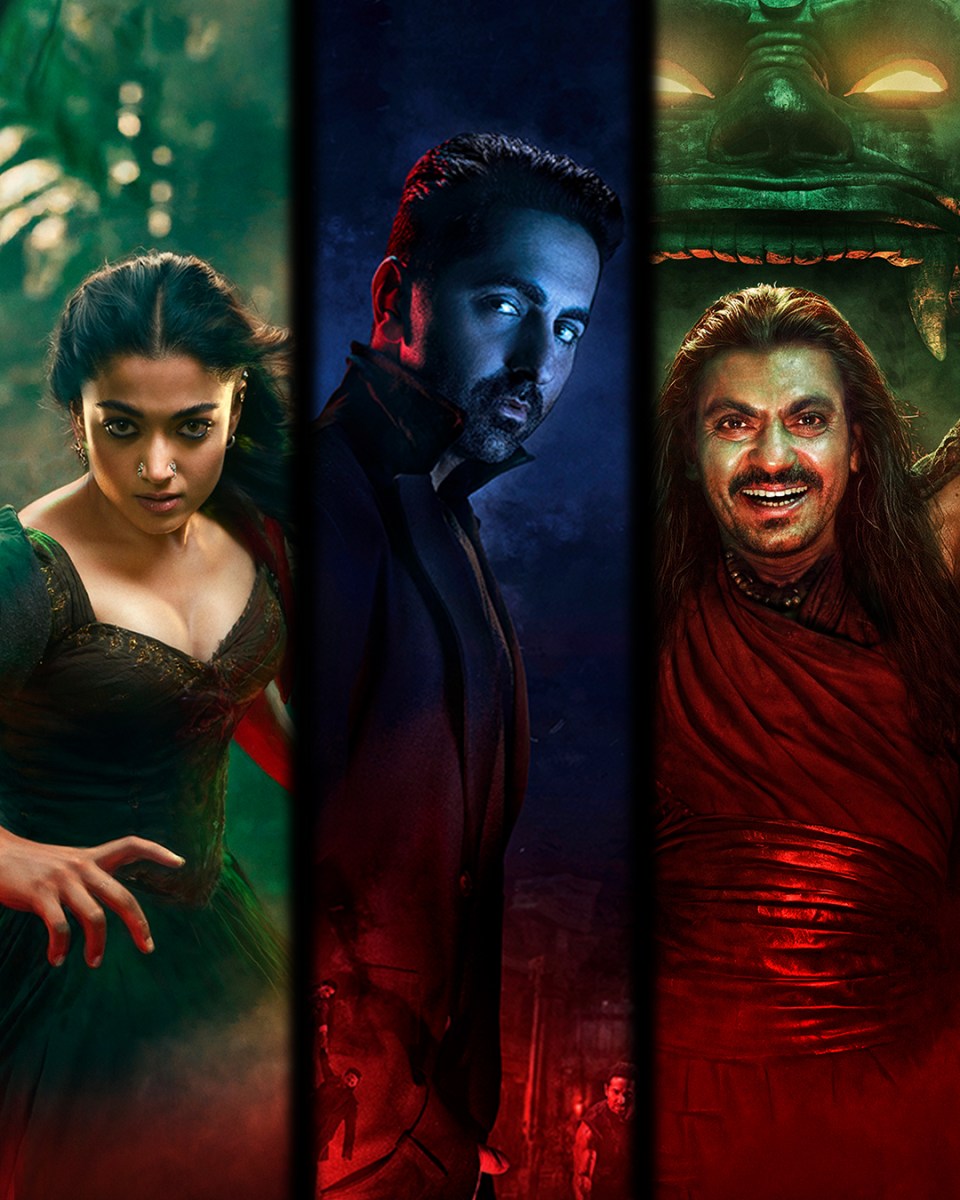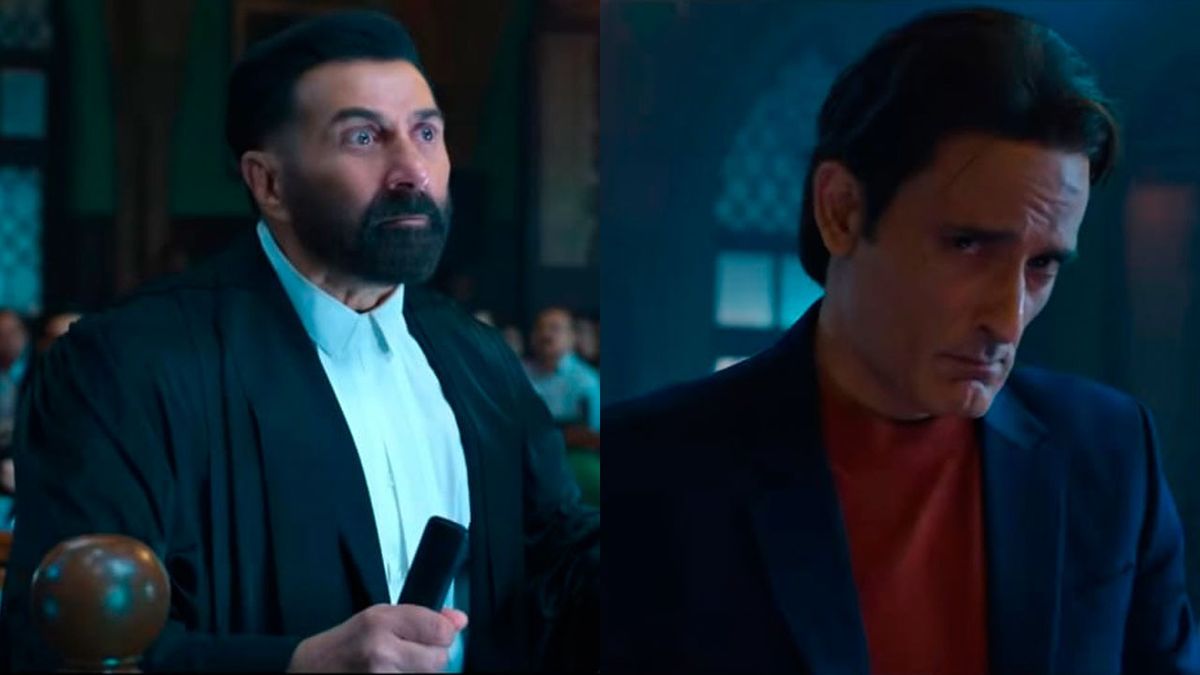
Gets lost in its good Betal, bad Betal narrative – Beyond Bollywood
Writer Niren Bhatt and director Aditya Sarpotdar blend two ancient Indian myths into a contemporary Maddock-style horror comedy, but the formula feels tired. Ayushmann Khurrana, Rashmika Mandanna hold forte but not enough to save a dull screenplay
Rating: ⭐️⭐️ ( 2 / 5)
By Mayur Lookhar
India’s ancient mythology and history form a vast treasure trove, much of which remains untapped in modern cinema. Taking inspiration from these legends to craft fictional worlds is a valid approach, but caution must be exercised to avoid distorting or misrepresenting history, especially mythology.
Director Aditya Sarportdar and writer Niren Bhatt’s film Thamma take excessive creative liberty by blending two distinct ancient mythologies to create the fictional realm of Thamma. (The double “m” is misleading, but perhaps the makers consulted the same numerologist who worked on Tanhaji).
The Rakhtbeej-meets-Betal narrative presented is unconvincing and problematic because it inaccurately attributes undue importance to the Betals in the stories of Rakhtbeej and Chandi Mata. Notably, through Thamma, Maddock Films has also created its own version of Betal folklore.
Story
The story opens in 323 BCE, where a smug Alexander meets his end at the hands – or rather, the teeth – of Yakshasan (Nawazuddin Siddiqui), the Thamma or leader of the Betal cult. “I dare you to conquer Bharat,” he warns before draining the tyrant’s life. So, we have a patriotic Betal here – though oddly, he seems to have slept through the centuries of Islamic and later Western invasions of India.

In present-day Delhi, reporter Alok Goyal (Ayushmann Khurrana) ventures into a dense forest to cover, or rather create, a paranormal story, but he is attacked by a large bear. He is rescued by a beautiful stranger who later reveals herself as Tadaka (Rashmika Mandanna). After spending a few days with her in the jungle, Alok grows fond of this enigmatic forest woman. Gradually, Alok uncovers the mystical and deadly world of the Betal cult that has inhabited these forests for centuries. It’s not just him, but the entire human race faces extinction if Yakshasan is left loose.
Screenplay & Direction
Director Sarportdar and writer Niren Bhatt have blended two unrelated mythologies in a bizaree way. The depiction of the Betal cult is baffling; although these undead Betals have killed humans for centuries, they claim to be moved by the bloodshed during the 1947 riots, declaring human blood more poisonous. They vow not to kill or drink human blood anymore. However, the lone dissenter, Yakshashan, is captured by his clan. Given that these mythical beings have killed humans without remorse for centuries, it is hard to believe that the tragic events of 1947 would suddenly change the Betals’ nature or ethics. What’s before us is a good Betal, bad Betal narrative that struggles to convince.
Clearly, Sarpotdar and Bhatt only scratch the surface of the ancient legends but end up making a meal of everything. Not that the film lacks entertainment or humour. It’s a slight upgrade from Sarpotdar’s Munjya and Amar Kaushik’s Stree 2, but the lack of a convincing plot and taut screenplay hurts Thamma dearly.
Performances

At FICCI Frames 2025, Ambassador Ayushmann Khurrana gently stated that he is taking a break from taboo but not quirk. It would be premature to suggest that Khurrana has fully switched to mainstream. For all its name, An Action Hero (2022) was still an experimental black comedy. Dream Girl 2 had its share of taboo, and despite its huge success, was essentially a mindless comedy. Thamma is positioned as Khurrana’s foray into mainstream cinema. It is his maiden horror comedy, but if you observe closely, it still features the vulnerable, underdog Khurrana in the character of Alok Goyal, a man who has no qualms about being protected by a strong woman.
Khurrana’s efforts are sincere, but there are a couple of questionable aspects to his character. Firstly, whether it’s Rajkummar’s Bicky or now Ayushmann’s Alok, why do Maddock Films’ horror-comedy protagonists often turn out to be SRK fans? It was fine initially, but now it feels repetitive.

Secondly, Alok partly rekindles memories of the tragic story of journalist-paranormal investigator Gaurav Tiwari, who died under mysterious circumstances. While the similarity ends with their profession, it seems unwise to create a paranormal reporter character in a quirky Bollywood film when Tiwari’s death remains a mystery. Moreover, the early mocking of Alok Goyal comes across as insensitive.

Rashmika Mandanna, once written off early in her career, has impressively transformed her fortunes in Bollywood within a short span. Director Sarpotdar skillfully leverages her splendid beauty, with fresh elements like two nose rings and black outfits helping her stand out among her cult role. Her hot body, accentuated by a strategic display of cleavage, adds to her commanding screen presence. It even prompts a playful thought: if surviving on animal blood can give you such a hot body, then why spend millions on cosmetic surgeries?
Mandanna is sincere early on, but midway, her Telugu accent briefly unravels. Nevertheless, the Mandanna-Khurrana chemistry is heartening. Given their long history, we’re still baffled as to how Tadaka is the lone woman in the Betal community in the jungle. There are more women, most strikingly Nora Fatehi, but these ladies live under disguises in the underground clubs of posh Delhi.

Nawazuddin Siddiqui’s portrayal of Yakshashan had us concerned from the moment the teaser was released. Despite his reputation as a versatile and powerful actor, this version of Betal suffers from weak writing and characterization, lacking the intimidation and menace expected of the character. The forced banter further detracts from his presence. For all the hype, Yakshashan never strikes you as a fearsome figure, neither centuries ago nor now. Instead, he appears as a wiry, unimposing man. Perhaps what he truly needs is not human blood but Shankhpushpi, (Ayurvedic herb). Though Siddiqui remains a sincere and resolute performer, he feels miscast here, unable to summon the mythic menace the role demands.
Music / Technical Aspects
Stree 2 had its flaws, but Sachin–Jigar’s music was riveting. However, the duo fails to recreate the same magic with Thamma. Since Jio Studios began backing Maddock Films, the quality of production, particularly the VFX-has been consistently impressive. Bhediya, Munjya, Stree 2, and now Thamma stand as the latest additions to that list.
Final Word
The Maddock Horror Comedy Universe has so far produced six films, including the standalone dud Roohi (2021). Despite some success, Stree (2018) remains the most impressive. Eight more films are lined up, but it’s evident that the post-Stree era films have taken a formulaic approach, with writers and directors rarely going beyond the sourced mythology. Thamma is disappointing for the discerning viewer, yet this template worked for Munjya (2024) and Stree 2 (2024), and it wouldn’t be surprising if Thamma finds its place among the successful films of the Maddock Horror Comedy Universe.
Watch the video review below.
Publisher: Source link

Effects Of Love On Your Brain And Body

How to Spend 24 Hours in Mumbai?


